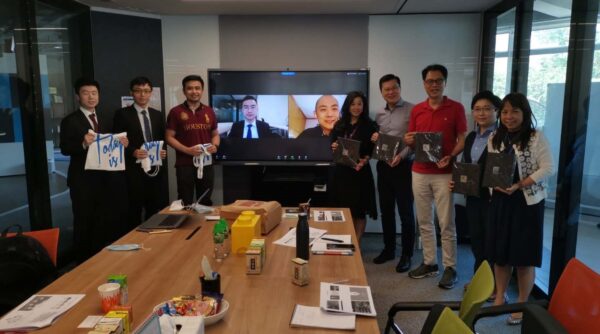CUHK MBA is the choice for leaders in Asia
- Fast track with Global Exposure: A 12-month MBA study course that equips you with Asian insight and expands your global perspective with business field trips. You can also gain fruitful experience by participating in exchange programmes or dual degree programmes with extended study period.
- Leading in the Digital Age: From fintech, AI, big data, digital marketing to digital transformation, develop your credentials as a future leader in the era of digital transformation
- Come to where East meets West: A range of exchange programmes, study tours and field trips blend international business learning with essential China business exposure
- Gain real-life exposure: Insights and hands-on experience all come with our Business Practicum projects and Entrepreneurship Training
Study Roadmap (12/16 months)
 |
 |
 |
 |
 |
 |
|
|
|
|
|
 |
|---|
|
 |
|
 |
|
 |
|
 |
|
 |
* The above curriculum, activities and study sequence are for reference only and subject to change.
Six Optional Concentrations
To tailor your MBA education for career acceleration and building expertise in a specific area, CUHK MBA will offer 6 optional concentrations in 2022-23.
Students may select either General MBA or up to two concentration options to complete the units of elective courses. Those choosing the concentration option(s) are required to complete 9 units of elective courses for each chosen concentration option(s).
Business Analytics
To help students strengthen data-driven decision making and prepare them for driving innovation, Business Analytics concentration aims to enable students to make extensive use of data for identifying business insights, predicting market changes, and ultimately improving strategic decision making for organisations.
Featured course examples under this concentration:
- Application of AI in Finance
- Database and Big Data Management
- FinTech Analytics
- Management Consulting
- Mergers and Acquisitions
- Platform and Business Strategies
- Digital Marketing
Entrepreneurship and Innovation
In the modern business environment, entrepreneurial mindsets are critical whether students plan to work within an organisation or start their own business. CUHK MBA is the first MBA in Asia offering an Entrepreneurship and Innovation concentration, is determined to help you embrace intrapreneurship, innovation, and agility and design thinking. We strive to train you to be among the continent’s most visionary leaders.
Featured course examples under this concentration:
- Management Decision Making
- Managing Family Business
- Mergers and Acquisitions
- Venture Capital & Private Equity
- Business Negotiation
- Current Fintech Trends
- Managing Innovation & Technology
- New Venture Business Project
- Platform and Business Strategies
- Applied Methods in Technology New Venturing
- Creating Self-efficacy and Impact on Communication
- Funding Technology Commercialization and Applied Entrepreneurship
- Design Thinking for Business Innovation
- Strategic Value of Innovation Technology
Information and Technology Management
In the digital era, advancement in information technology is fundamental to success. Information and Technology Management concentration allows students to learn how to leverage cutting-edge IT skills, data and business analytics to develop effective business strategies.
Featured course examples under this concentration:
- Database and Big Data Management
- Digital Marketing
- Managing Innovation & Technology
- Platform and Business Strategies
- FinTech Analytics
- Application of AI in Finance
Finance
The world is experiencing digital transformation, and nowhere is this clearer than within finance. CUHK MBA offers in-demand technological and financial skills with a focus on analytical and critical thinking, all of which is essential to help you thrive in the competitive workplace and to be an innovative leader in the digital age.
Featured course examples under this concentration:
- Business Valuation and Analysis
- Current Fintech Trends
- Venture Capital & Private Equity
- New Venture Financing in China and Emerging Markets
- Corporate Fund-Raising Initiatives in the Chinese Equity Markets
- Mergers and Acquisitions
- Investment Analysis and Portfolio Management
- Money and Capital Markets
- FinTech Analytics
- Application of AI in Finance
- Sustainable Finance and Impact Investing
- Funding Technology Commercialization and Applied Entrepreneurship
China Business
China’s emergence into the world economy and the development of the Greater Bay Area offers a unique opportunity for prospective business leaders. Students in the China Business concentration can benefit from CUHK’s long-established role as a gateway between China and the rest of the world.
China Business concentration is designed to enable students to discover market opportunities in China by mastering China business knowledge and practical training about doing businesses in China.
Featured course examples under this concentration:
- China in Global Economy
- Corporate Fund-Raising Initiatives in the Chinese Equity Markets
- Managing Family Business
- New Venture Financing in China and Emerging Markets
- Digital Marketing
- Design Thinking for Business Innovation
- Sustainable Finance and Impact Investing
- Creating Self-efficacy and Impact on Communication
Marketing
To win in the age of the empowered consumer, Marketing concentration is primarily geared toward those students with an interest in managerial marketing and big data marketing by learning data-driven and strategic marketing knowledge.
Featured course examples under this concentration:
- Digital Marketing
- Behavioral Decision Making
- Database and Big Data Management
- Business Negotiation
- Creating Self-efficacy and Impact on Communication
- Design Thinking for Business Innovation
** The featured courses offered are subject to change in each term and academic year.
Business Practicum
You will have a chance to participate in one of the projects sponsored by diverse Hong Kong corporations and see how your business ideas, models, and hypotheses play out in the real world to solve a business challenge. A senior staff of the sponsoring company also joins the team as a supervisor to support the successful completion of the project. We offer a wide range of practicum topics like retail, transport, healthcare, hotel and tourism, and property.
This elective course is open for full-time and part-time Year 2 MBA students.

Field Studies
With business field study trips to Greater China, Asia, Europe and the United States, CUHK MBA students leave the school grounds for a short while to see beyond the business setting already familiar to them.
Expect to make new connections between your areas of study by experiencing them first-hand in a culturally different environment, and enhance your understanding through visits and interactions with local enterprises, lectures and seminars, business professionals, government officials and local alumni.
Exchange Programme
With distinguished universities worldwide as exchange partnering schools, students are provided with a truly global perspective and benefit from a significant expansion of their global networks and far greater opportunities to demonstrate their ability to be a global leader.
United States / Canada
- University of Michigan
- University of British Columbia
- The University of Chicago
- The University of Toronto
Europe
- Bocconi University
- HEC Paris
- London Business School
- Warwick Business School
- IE Business School
Asia
- CEIBS
- National University of Singapore, NUS Business School
- Seoul National University
- Peking University
- Waseda University
Full Course List
Course offerings are subject to change. All MBA courses will be taught in English, with the exception of elective courses of a unique nature in which teaching in Chinese is preferable.
Artificial Intelligence (AI) is being used in the financial services industry worldwide. Financial institutions and Financial Technologies (FinTech) start-ups are using AI methods to assess credit quality, to price and market insurance contracts, and to automate client interaction. Some of these companies are optimising scarce capital with AI and machine learning techniques, as well as back-testing models and analysing the market impact of trading large positions. Hedge funds, broker-dealers, and other firms are using AI to find signals for higher (and uncorrelated) returns and optimise trading execution. These companies are using these technologies for regulatory compliance, surveillance, data quality assessment, and fraud detection.
Making decisions, from the trivial to the fundamental, is part of the everyday life of every manager and investor. For the last 30 years, psychologists — and more recently also economists — have studied how people process information and make decisions. This research program has provided an insightful understanding of how people’s decisions deviate from “optimal” ones, and the consequences of such biases in financial and personal terms. This course is devoted to understanding the nature, causes and managerial implications of these limitations. It will help the students discover a series of serious yet often overlooked mistakes that most people would commit in a variety of decision contexts, including investment decisions, hiring decisions, purchase decisions and even marital decisions. At the same time, this course will also teach them how to correct these mistakes and how to reach optimal solutions. Instead of overwhelming the students with mathematic models or academic theories, this course will use many in-class exercises and questionnaires to convey the concepts.
This course introduces current research and thought on the negotiation process, and provides opportunities for students to apply the concepts and skills in simulations of actual negotiations. Strategic lessons are learned from different actual cases. The objective is to enable students to appreciate the art and science of negotiation, to understand how to resolve conflicts and derive the most out of bargaining.
This course provides an opportunity for the MBA students to apply what they have learned in the classroom to solving real-world business problems. A minimum of three and a maximum of five students are required to form a project team, under the supervision of a BA faculty member. A project proposal outlining the work to be undertaken by the project team must be approved by the supervising faculty member and endorsed by the Director of MBA Programmes or his/her representative within 10 calendar days from the start of the term. The project must be sponsored by a company in Hong Kong and approved by the Director. The sponsorship includes joint supervision of the project by an appointed senior staff of the company, pledge of assistance and support to ensure the successful completion of the project, and possible remuneration to members of the project team, other than the supervising faculty member, for the work undertaken. Students are expected to spend, on the average, one day a week throughout the duration of the project. The project duration must cover the term time as published by the University calendar, but should not exceed four months in duration. A final report of the project to be submitted to the supervising faculty member and an oral presentation of the results to the management of the sponsor is part of the requirements of the course. The final grades of the students will be determined by the supervising faculty member, in which the evaluation of the project by the sponsoring body should be reflected.
(Open to all full-time and part-time Year 2 MBA students)
This course introduces a framework for business valuation analysis using corporate disclosure and financial statement data. The framework identifies four key components of valuation: business strategy analysis, accounting analysis, financial analysis, and prospective analysis. Employing a case methodology, applications of this framework in a variety of decision-making contexts including securities analysis, credit analysis, and merger and acquisition decisions are examined.
Effective communication and strong personal branding are keys to compelling leadership. In this practiceoriented course, participants will learn how to build confidence and develop a personal brand that will enable them to communicate effectively like a business leader. In addition, you will learn how to deliver messages clearly, both written and verbal, to a high-profile business audience. A few panel discussions featuring executives from several industries will be conducted, where students have the opportunity to observe and interact directly with senior business executives.
To fulfil the major assessment requirement of this course, students will form panel discussion teams themselves, and speak on important business topics in a simulated conference environment.
This course is designed to help students understand the role of China in the Global Economy. We will review the reforms and the current state of the Chinese economy and its financial markets. Major topics such as the Belt and Road Initiative, The Bay Area, Sino-US trade war, China and ASEAN, Islamic Finance will be covered. We will also study the development of e-payment the green economy in China.
This course provides a graduate-level overview of the principles and concepts that underlie corporate financial reporting and the economic consequences of accounting choices. The course focus is on developing the skills required to interpret the information contained in financial statements and its use in decision-making rather than on the skills required to prepare financial statements. Topics include the use of accounting information in evaluating firm performance, and corporate reporting policies.
This course delves into the major issues surrounding equity fund-raising in China. The principal focus is on initial public offerings (IPOs) and seasoned issues in Chinese stocks (including H- share, ‘red-chip’, private Chinese and ‘China-concept’ issuers) listed in Hong Kong. The characteristics of the various corporate entities and the nature of the funding methods utilized are critically explored. Case analysis of major IPO and seasoned equity issues (rights issues and private placings) features to amplify these objectives. Shanghai A- share listings are also considered as well as the various reforms to its constituent issuers. These include the transformation of non-tradable stock holdings into tradable form, the development of QFII and QDII schemes and the key reforms to China’s leading state-owned commercial banks. Finally, dual listings, such as American depositary receipts, and alternative routes to listing (‘reverse takeovers’) are also assessed. Upon completion of the course, students will have developed key insights into a major global funding activity.
Theories will stay on paper forever if they are not applied in practice. To become a successful business leader in the future, you need to master the skills of effective communication and be able to communicate with impact. This course will help you acquire the necessary skills of a great communicator and break your psychological barrier when you present in front of audience(s).

